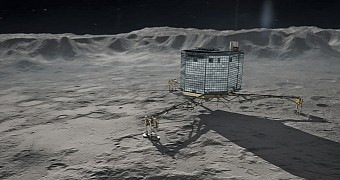Rosetta's lander Philae is the first probe people have managed to send to a comet, and it's now awake again after a seven-month wait.
The European Space Agency was successful in landing a small lander on a comet back in November 2014, which marked a great achievement for the space program. It was the first of its kind, but the landing didn't go as smoothly as expected, and the lander had to go into hibernation until that side of the comet turned towards the sun.
It's been a long wait, but the scientists from the Lander Control Center at the German Aerospace Center (DLR) in Cologne have announced they've made contact with Philae, and they have already received some packages from it. What's even more interesting is that it seems that the lander has been awake for some time, and it has just now managed to get in touch with the scientists on Earth.
Philae is alive and well
Being the first one anywhere is a big deal in space, and Philae's mission has captured the imagination of the entire planet. When Rosetta, the robotic space probe from ESA, managed to get into orbit of the 67P/Churyumov–Gerasimenko comet after a long and complicated flight, the world started to pay more attention to it. Soon after that, the small Philae lander made contact and gave everyone a scare that it might have completely missed its landing. Now, Philae is talking to us again.
"The signals were received at ESA's European Space Operations Centre in Darmstadt at 22:28 CEST on 13 June. More than 300 data packets have been analysed by the teams at the Lander Control Center at the German Aerospace Center (DLR). Now the scientists are waiting for the next contact. There are still more than 8000 data packets in Philae’s mass memory that will give the DLR team information on what happened to the lander in the past few days on Comet 67P/Churyumov-Gerasimenko," said the scientists from Cologne.
This is all the information we have so far, and it's unclear for how long Philae will manage to remain active, but the scientists will make the best of it.
Incredible news! My lander Philae is awake! http://t.co/VtzAQHx4zT pic.twitter.com/SZqnsnNpUZ
— ESA Rosetta Mission (@ESA_Rosetta) June 14, 2015

 14 DAY TRIAL //
14 DAY TRIAL //